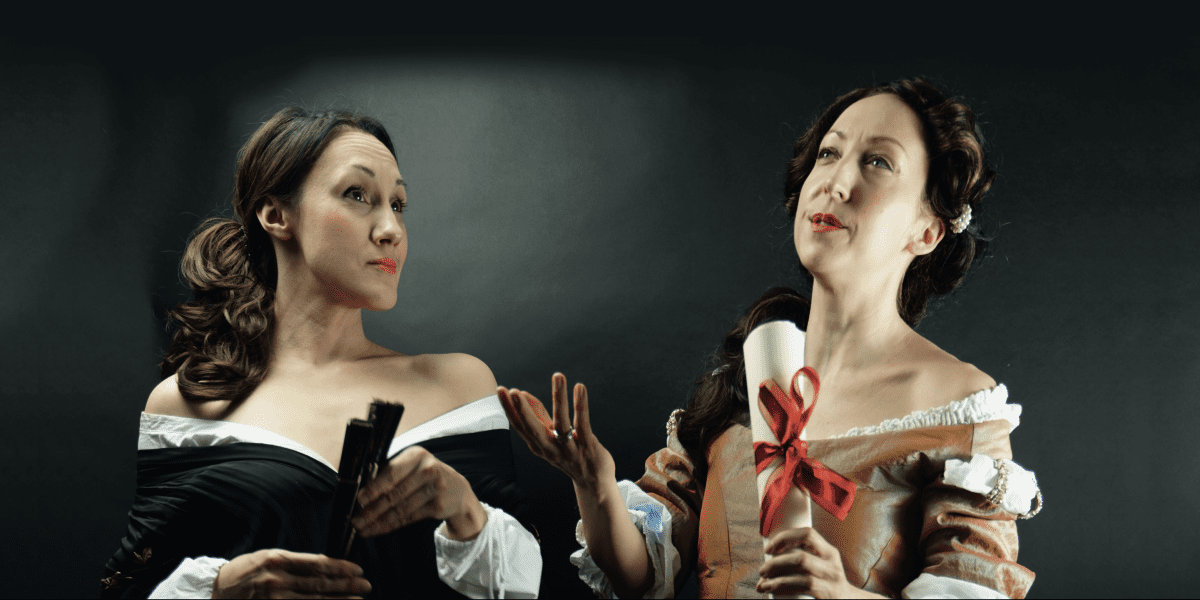A new play Oranges and Ink celebrates two extraordinary women from the seventeenth century: Aphra Behn and Nell Gwyn. Behn was one of the most popular playwrights of her age outselling male writers and Gwyn dominated the Restoration stage as a successful comedy actress which led her to becoming Charles II’s favourite mistress. Both knew and supported each other in their respective careers and lives, which this play is about.
Oranges and Ink remind us that in our #MeToo age we have come a long way, but that the war against patriarchy and moral judgment against women is not over. Behn’s plays were becoming increasingly risqué sexually, though not more than that of her male counterparts, yet she was facing jail for it and often earned the epithet of a whore. Of course, women in the theatre had always been accused of practising the oldest profession in the world — growing success was accompanied by envy, and a woman in a traditionally male profession was subject to attack. Gwyn, as an actress and mother of Charles II’s bastards, was reviled for her conduct in public and was not able to enjoy fully her raised social status or her onstage career.
Amias and Lawrie bring the Restoration age to life with ease, charm and intelligence. Amias, who also wrote the play, performs the part of Behn with energy and flair as her own quick-witted lines demand. Lawrie is an exquisite comedy talent and her Nell Gwyn creation is a joy to watch. Oranges and Ink is not melodramatic or in-your-face feminist – and does not try to put Behn or Gwyn on the pedestal. It shows them more realistically as clever, creative women caught up between the Restoration’s royal court politics and the conniving entertainment business. As Behn and Gwyn continue to remain in the public eye, they are also under constant public scrutiny, which chimes with the fate of female artists and celebrities today.
It is fascinating and often hilarious to be able to be a fly on the wall and listen into Behn and Gwyn’s conversations. When Behn tries to lure retired Gwyn to stage with her new play The Feigned Courtesans, her friend exclaims with a jolt, ‘not another play about whores!’. She only considers it when Behn explains the play is in fact about virgins who pretend to be courtesans only to get some freedom to flirt with men (in the seventeenth century, young unmarried women were chaperoned everywhere). But there are also a lot of touching moments in the production, when they share their complicated life stories. We learn that Gwyn was separated from her sons at an early age by the royal household and then lost them to sickness.
It would be easy to dismiss this little show as a low budget ‘fringe production’: the set design is minimal and consists of a few pieces of period furniture while the production’s background is a black dividing panel. At one hour it is also a fleeting affair. But with a few careful costume and lighting choices (I especially liked the use of candles), and thanks to period music specially arranged for the production the play successfully recreates the domestic setting of a Restoration home.
Overall the show is a delight to watch, and I hope it is going to tour around the UK soon. I urge you not miss the opportunity to be part of this high-spirited, moving and sparkling with intelligence, female-led theatrical venture. If you are in London now, rush to Tristan Bates Theatre, you will leave the show thoroughly entertained, moved and you will learn a few things about Restoration stage and its amazing women. The show ends with a line ‘I hope you’ll forgive the lack of men’. I do forgive, heartily.

